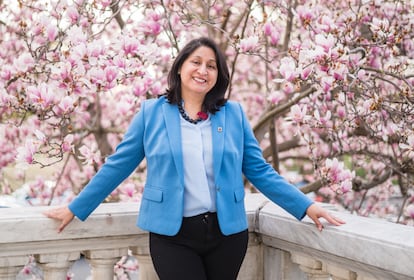Vanessa Cárdenas, executive director of America’s Voice: ‘The Administration’s goal is to change the definition of who is an American’
From her position as leader of one of the most important pro-migrant organizations in the country, she warns of the rise in racism and the measures that are coming with the Trump Administration


Vanessa Cárdenas, 49, was born in Brooklyn, New York, but grew up in Cochabamba, Bolivia, where she lived until she was 14, when she returned to the United States. She was the first person in her family to attend college, and a prolific career led her to work on Joe Biden’s first-term presidential campaign, the EMILY’s List political action committee that advocates for pro-abortion candidates, the Center for American Progress, the Latino organization LULAC, and the World Wildlife Fund (WWF). As executive director of the pro-immigrant organization America’s Voice, she advocates for immigration reform that provides a path to citizenship for the millions of undocumented immigrants living in the U.S. In this interview with EL PAÍS, she criticizes the Trump administration’s immigration policies, which have led to increased racism and are only aimed at strengthening the president’s political base. Cárdenas lives with her family outside Washington, DC, in Northern Virginia.
Question. The definition of undocumented migrants seems straightforward, but the recent torrent of legislative action and anti-immigration measures has created a lot of confusion about the term. What about people whose permits are being revoked by the current administration, such as those who have benefited from humanitarian parole, TPS, or those who applied for asylum through the defunct CBP One application?
Answer: The definition used is that of a person who does not have current authorization to be in the United States. Technically, they are not undocumented. They arrived under a legal process that the Biden Administration granted them. However, we are seeing something unprecedented: an administration that is revoking established programs for immigrants at a very accelerated pace, stripping them of their legal status and telling them they must self-deport. Just as the Executive Branch has the ability to implement these policies for immigrants, it also has the ability to take them away. Biden created the programs to legalize these people, and Trump is taking them away.
Q. The cancellation of these programs increases the number of undocumented immigrants. Isn’t that contradictory to the idea of reducing the number of people living in the country without papers?
A. Absolutely. By canceling these programs, what you’re doing is increasing the number of undocumented immigrants in this country. And not only that, you’re pushing them further into the shadows, into illegality, with these policies that seek to instill fear in the immigrant community.
Even if the court were on our side, I wonder if this Administration would follow the order of the courts. We will see if the system holds up. That is why it is so important not only for immigrants but for Americans in general
Q.There is a widespread view that the immigration system is broken and needs profound reform. Many of Trump’s executive orders have imposed radical changes.
A. It’s clear there’s no sincere interest in improving the system or trying to find a solution. What they’re doing is feeding their base, because immigration is part of their political strategy to advance their ideology. The humanitarian parole program is one of the most innovative things they’ve done; it creates legal channels so people don’t have to put themselves in the hands of a coyote. If the United States wants to have a functioning immigration system, it must open legal avenues; eliminating them all isn’t the solution. Besides, we already know the labor needs there are.
Q. One of the recently announced measures includes reviewing the social media accounts of individuals applying for immigration permits. Have you made any recommendations in this regard?
A. It’s very problematic because we’re seeing not only immigrants at airports, but also citizens being asked for their phones to check their social media accounts. This goes against freedom of expression. Unfortunately, we’re in a situation where we’re telling our co-workers and family members that they have to be more vigilant and careful than we’ve ever been before—to check their social media accounts to avoid any problems with immigration.
Q. The case of Kilmar Ábrego García, the Maryland resident who was deported to El Salvador despite having judicial protection, has gained a lot of notoriety. Do you think it is an isolated case?
A. No, we’ve heard of several cases of people, especially Venezuelans, who had no criminal record and are now in prison in El Salvador. What’s different about this case is that the government has admitted it made a mistake. It’s extremely dangerous for the same government to say that, despite making a mistake, they can’t bring them back. This shows how aggressively this administration is trying to remove as many people as possible from the United States, regardless of the consequences for their families, even if they’re here legally or if they are citizens. It’s very dangerous, not only for immigrants but for all of us because it has implications for our rights, for our freedoms. If we let this happen, they will be unstoppable.
Q. Are you confident that the courts will stop Trump’s more aggressive policies?
A. I have some hope that the Supreme Court justices will stand by their oath to the Constitution, even though a majority of justices are from the conservative wing. I would like to say that I am confident because the facts are on our side, but I have doubts because of the political moment we are in, because of the ideology that is advancing with this Administration. Even if the court were on our side, I wonder if this Administration would follow the order of the courts. We will see if the system holds up. That is why it is so important not only for immigrants but for Americans in general.
Q. What has changed in your organization since January 20?
A. As one of the national pro-immigrant groups, we are very exposed. We discuss what that means among our colleagues and try to protect ourselves as best we can with the resources we have. We are at a point where one has to recommit to the cause to which we have dedicated so many years, knowing that today our voices, our work, our advocacy are more important than ever.
Q. What do you recommend to migrants?
A. They should talk to a lawyer and explore how to protect themselves as soon as possible. Although there are no guarantees, this is what they can do. Despite everything, immigrants are very resilient, very positive. We are fighting with a very resilient population. That’s what we need to hold onto. Most people get up every morning to go to work to support their families under terrible circumstances. And that spirit is what will save us from this situation. The only thing we can do is live our lives taking the necessary precautions and have faith that the policies of this Administration will be rejected in the upcoming elections.
Q. Do you think that racism and xenophobia have increased among the population?
A. There has certainly been a rise in racism. And it’s not surprising given the combined strategy of putting millions of dollars into anti-immigrant ads, the digital coordination of extremist groups with the narrative that immigrants are bad for the United States, and the economic instability that people feel.
There’s a lot of frustration with our immigration system, and groups advocating for change have been saying this for almost 30 years. The problem is that when we don’t have solutions that people can believe in, and we only hear from one party 24/7 that migrants are committing crimes, people believe it. But the things Trump and his allies say about immigration aren’t based on real facts. Immigration is positive for the United States. There are countless economic studies that talk about the contributions of immigrants, that they are essential to the economic prosperity of this country. That is the true and real narrative about immigration. However, a narrative that isn’t based on facts has been accepted, as part of a political strategy, and Americans are accepting it because they don’t feel there is a viable solution.
Q. The severity of the measures against migrants will also have its detractors…
A. Yes, we also see that people are very uncomfortable when deportations are affecting established families who are rooted in communities. We saw this in Trump’s first term, when families were being separated. People are saying they want the system better organized, that we need to get people out, but they don’t want it to affect their neighbor, who has been here for decades, and they don’t agree with deporting people without criminal records. The more they understand the human and economic consequences, the more they will reject this agenda of mass deportations.
Q. What immigration policy do you consider to be the most controversial one of this Administration?
A. What’s having the greatest impact is sending people with no criminal record to the prison in El Salvador, without access to a lawyer, just abandoning them in another country. Most people understand how dangerous it is, and that’s why Mr. Ábrego García’s case is going to be so important.
Q. What do you expect from this Administration in the coming years?
A. We’re going to see more of what we’ve seen these past three months. Attacks so that undocumented immigrants will not be counted in the census, not because undocumented immigrants are voting, but because that’s a fundamental part of their argument to ensure that elections go in their favor. We’re going to see more attacks on birthright citizenship. This Administration is truly committed to meeting the goals of Project 2025 and they’re going to accelerate those efforts. At the same time, as they did in the first Trump Administration, they’re going to change the processes to reduce legal immigration.
Fundamentally, the goal is to change the definition of who an American truly is. There’s an ideology behind these efforts, and immigration is a key part of enforcing their agenda.
Sign up for our weekly newsletter to get more English-language news coverage from EL PAÍS USA Edition
Tu suscripción se está usando en otro dispositivo
¿Quieres añadir otro usuario a tu suscripción?
Si continúas leyendo en este dispositivo, no se podrá leer en el otro.
FlechaTu suscripción se está usando en otro dispositivo y solo puedes acceder a EL PAÍS desde un dispositivo a la vez.
Si quieres compartir tu cuenta, cambia tu suscripción a la modalidad Premium, así podrás añadir otro usuario. Cada uno accederá con su propia cuenta de email, lo que os permitirá personalizar vuestra experiencia en EL PAÍS.
¿Tienes una suscripción de empresa? Accede aquí para contratar más cuentas.
En el caso de no saber quién está usando tu cuenta, te recomendamos cambiar tu contraseña aquí.
Si decides continuar compartiendo tu cuenta, este mensaje se mostrará en tu dispositivo y en el de la otra persona que está usando tu cuenta de forma indefinida, afectando a tu experiencia de lectura. Puedes consultar aquí los términos y condiciones de la suscripción digital.








































